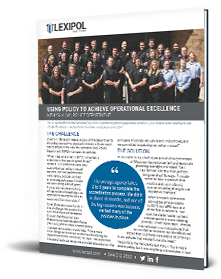The Challenge
Chief Tim Styka still keeps a copy of the department’s old policy manual—a physical reminder of how much has changed in the way the Menasha (WI) Police Department (MPD) manages its policies.
“When I became chief in 2011, I inherited a department that was in good shape,” he says. “Our practices were very sound—but our policy manual was not. We had policies that were yellow, policies printed on mimeograph paper. I knew we were doing a lot of good things, but we were working off operational knowledge, as opposed to taking the time to document the information.”
Chief Styka saw opportunity in this challenge. He wanted the MPD to achieve accreditation through the Wisconsin Law Enforcement Accreditation Group (WILEAG), and he knew a better policy management system would help. “There were three things we knew we needed to do to bring the department to the next level,” he says. “We expanded the use of body cameras, we provided education on the principles of procedural justice and implicit bias, and we committed to updating our policy manual.”
The Solution
In 2009 and 2010, Chief Styka served on a committee of Wisconsin law enforcement professionals providing oversight to Lexipol. “So I was familiar with the manual from the ground up,” he says. “It made sense to have a product that would assist us in staying current on policy changes and legislative changes.”
When Lexipol’s Wisconsin service became available in 2011, the MPD was one of the first customers. “We took the state master content and compared it to our existing policies,” Chief Styka says. “If there was verbiage in our old policies that we needed to maintain, we identified and added that. But there were also a lot of things in our policies that we didn’t want to keep.”
He points to the Vehicle Pursuit Policy: “Ours was a decent policy, but it was very long and complex. It had things like the definition of a high-speed pursuit versus a moderate-speed pursuit.” The content provided by Lexipol allowed the MPD to simplify the policy while still providing valuable guidance. “Many agencies in our area have gone to very restrictive pursuit policies that basically say don’t pursue,” Chief Styka says. “We will still pursue, but our policy makes clear it’s only under very specific circumstances unique to each situation. Before we adopted the Lexipol policy, those circumstances were difficult to figure out.”
The MPD also uses Lexipol’s scenario-based Daily Training Bulletins (DTBs). “DTBs are what really make the policy manual come alive for our agency,” Chief Styka says. “Policy review is completely different when you’re giving people real-life examples. Some of the scenarios appear so real it seems like they came from our department. But it’s because they reflect universal issues officers are facing. DTBs help our officers make good decisions.”
The Results
The MPD is realizing many benefits from its investment in Lexipol, including:
- Increased transparency. “When updates were released in the past, you’d either have no discussion, or you’d get the individual supervisor’s spin on it,” Chief Styka says. “With Lexipol, we receive release notes for every update, and we pass that on to the officers so they can understand why the change is being made. They also see the changes marked in the side-by-side comparison. So there’s utter transparency about what’s changed.”
- Enhanced efficiency. The MPD has moved from a pen-and-paper policy update process Chief Styka calls “arduous” to using Lexipol’s electronic workflow tools. “It’s way more efficient, and efficiency is a cost-savings,” he says.
- Fast-tracked accreditation. Chief Styka credits the Lexipol policies with drastically reducing the amount of time it took for the department to achieve WILEAG accreditation. “The manual assisted us in probably about 70 to 75 percent of the content that we needed,” he says. “The average agency takes two to five years to complete the accreditation process. We did it in about 18 months, and one of the big reasons was because we had many of the policies in place. A lot of agencies have to rewrite their policies as they’re going through accreditation. We just made a few tweaks.”
- Reduced personnel complaints. “We were averaging about three citizen complaints a year,” Chief Styka says. “Since implementing Lexipol, as well as the additional training and expanded use of body cameras, the number of complaints has significantly decreased. The number has dropped to less than one per year and only one complaint in the past seven years has been sustained.”
There’s an intangible benefit, too—the confidence that comes from knowing the MPD’s policies reflect national best practices in law enforcement. “Recently Wisconsin made some changes in its use of force language, and it was a big change for some agencies,” Chief Styka says. “But our policy was already in line with the new language. That’s happened several times, and it just reinforces that with Lexipol, we’re ahead of the curve.”



